Black Sea Security Conference
Recent Articles
Author: Caspian Policy Center
01/26/2024
JANUARY 24, WASHINGTON, D.C. – “Strategically, the Black Sea is one part of an emerging middle corridor that helps the South Caucasus and, by extension, Central Asian states diversify their economies and keep an avenue open for their Western economic and political integration,” said Dr. Celeste Wallander, Assistant Secretary of Defense for International Security Affairs in the Office of the Secretary of Defense for Policy at the U.S. Department of Defense.
Wallander delivered keynote remarks, discussing how the U.S. government and its allies prioritize the Black Sea region and seek to support Ukraine, at a “Black Sea Security” conference cohosted by the Caspian Policy Center (CPC) and the Caucasus and Central Asia (CCA) club at Johns Hopkins University’s School for Advanced International Studies (SAIS), which brought together a range of key U.S. government officials and experts to discuss critical security challenges in the Black Sea region.
Wallander discussed specific U.S. policies that will help the region “protect its territorial integrity and address Russia's destabilizing and threatening activities.” Since Russia’s invasion of Ukraine in 2022, “Russia has used the Black Sea ... to trample upon international norms and international law in the entire region, which has brought broader global implications,” said Wallander. However, the Assistant Secretary emphasized that Ukraine enjoys “unwavering support” from the United States, “NATO allies, and like-minded partners” in the Black Sea region.
Russia’s actions have “demonstrated the strategic importance it places on the Black Sea as a region from which to project economic and military power. Its armed forces have attempted to strangle Ukraine's economy and delegitimize its government, as evidenced by repeated strikes on Ukraine's economic infrastructure and other nonmilitary targets by Russian forces,” Wallander said
In response, she continued, “The United States, our NATO allies, and like-minded partners have directed greater focus for security and economic assistance and additional forces to the Black Sea region…. The United States is working to promote stability in the Black Sea region through a multilateral approach to bolstering maritime security, all-domain awareness, and economic vitality to Black Sea partners.”
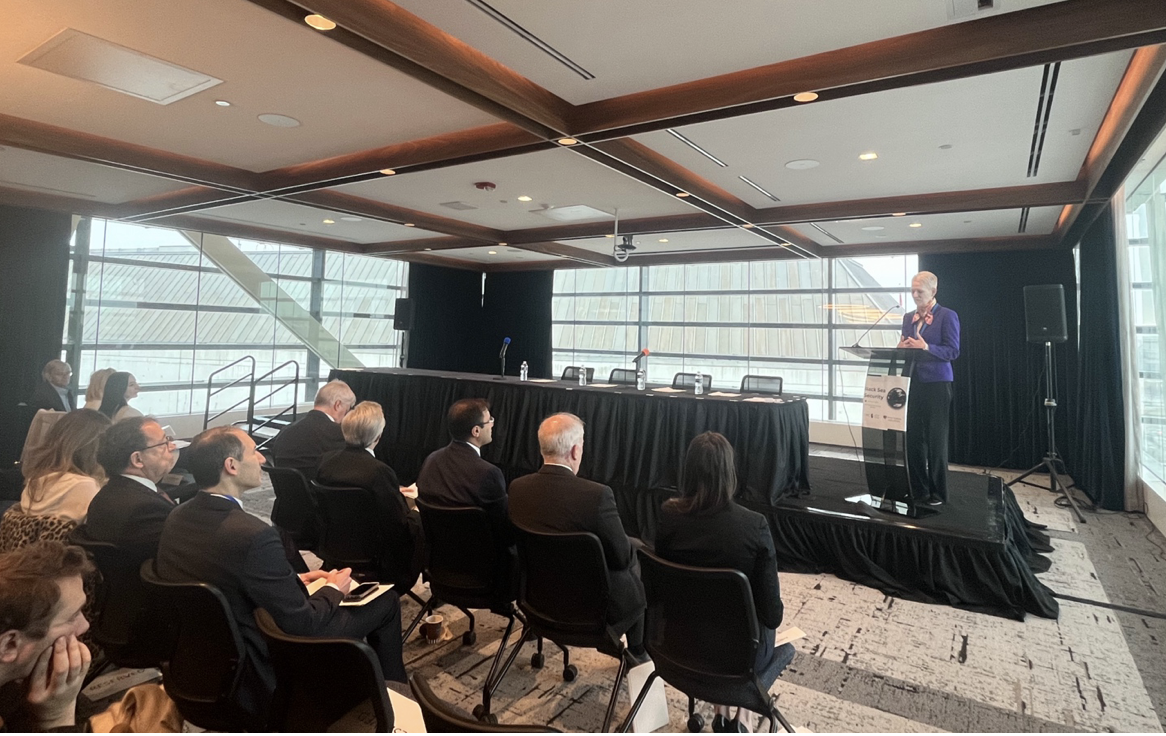
As a priority, the United States has committed to “bolstering maritime and…integrated defensive capabilities, including integrated air and missile defense that can reinforce integrated deterrence,” she said. “We are continuing to invest in security assistance programs, which create more seamless systems and provide better indications and warnings of threats that might destabilize the Black Sea region.”
“We [the United States] have prioritized the delivery of strategic and short-range air defense systems to Ukrainian armed forces since Russia's full-scale invasion in February of 2022, dedicating a Patriot battery, several NASAMS systems, and multitudes of short-range systems.” Wallander added that these systems “allow the training to effectively defend critical infrastructure, such as its electrical grids, heating and energy systems, and Ukraine's ports.”
The United States “…strategy is to be assured that the Black Sea will not become a ‘Russian lake.’ Taking practical steps to maintain commercial access and improve interoperability among regional states not only helps NATO, but it preserves an avenue of cooperation with our partners, like Georgia and the [other] countries of the greater South Caucasus who rely upon a more secure Black Sea to safeguard their own economic livelihood.”
Wallander went on to describe the importance of encouraging regional connectivity and cooperation. Bolstering wider region coordination “will not only build on Ukraine's existing and quite successful efforts to keep Russia out of the northwestern portion of the Black Sea but also strengthen Ukraine's naval capacity and capabilities to safeguard its territory and its economy in the coming years.”
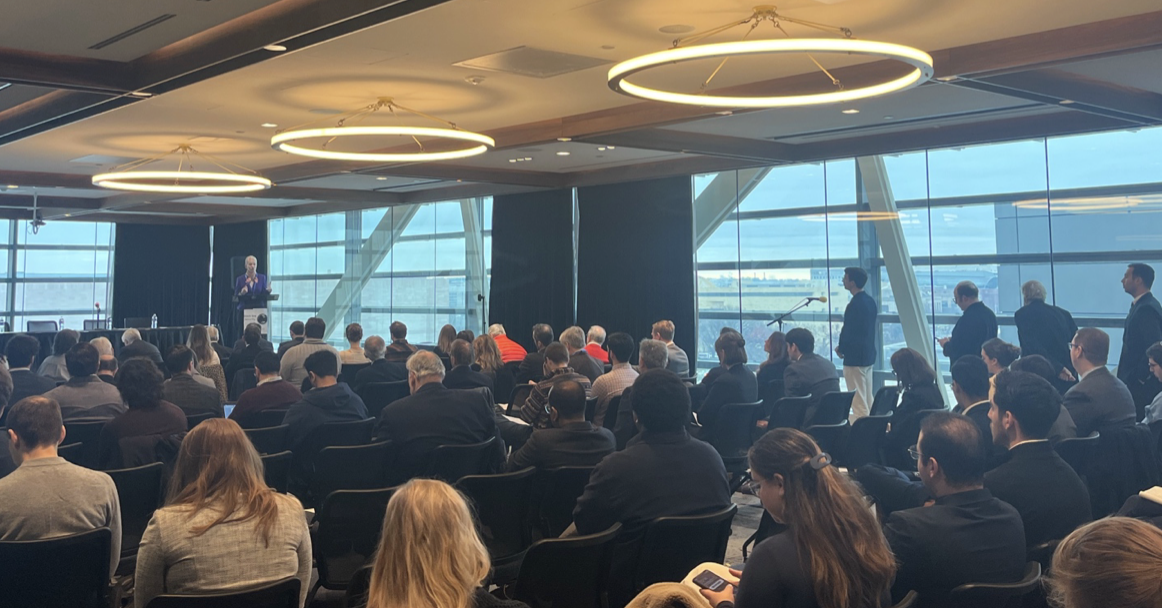
“In Georgia, the United States remains committed to our defense partnership and undertaking significant defense capacity building and reform programs,” said Wallander.
“In Moldova, Armenia, and several Central Asian states, Russia is no longer seen as a reliable, or even desirable, security partner. The coming years present an important opportunity to deepen our defense relations with these and other states that share our values and want closer relations with the West,” Wallander added.
Wallander also spoke regarding the role of the U.S. in the reconciliation process between Armenia and Azerbaijan. “There is absolutely focused, steady, high-level leadership in talking to both the leaderships of Armenia and Azerbaijan about continuing de-escalation of violence, the absolute requirement to not allow new flashpoints, to create access for the international community for reconstruction, for not only providing humanitarian assistance but also longer-term reconstruction and reconciliation, if possible,” she emphasized. Speaking on the U.S. Defense Department’s involvement, Wallander said the following: “It is challenging because of the longstanding disagreements and friction between the leaderships and, in fact, the civil societies of the two countries. But this really does attract very high-level attention. The Defense Department plays a supporting role. We have been very interested in working with Armenia. We have a long-standing, limited defense relationship with Azerbaijan, focused on border security, counter-proliferation, preventing trafficking, really important issues given the Caspian, given who one of Azerbaijan’s neighbors is [Iran].”
“Looking to the South of the Black Sea Basin, Turkey has demonstrated its geostrategic significance as an important strategic partner throughout the crisis with Ukraine. Turkey has scrutinized the passage of Russian warships through the Turkish straits, supported Ukraine's territorial integrity, and Turkey was integral in setting up the [now suspended] Black Sea Grain initiative.” Wallander emphasized Turkey's role “as an important ally to promote Black Sea security and to address Russia.”
The stronger, more economically independent, and more connected the Black Sea region becomes, the more the region will be able “to protect its territorial integrity and address Russia's destabilizing and threatening activities, both within Ukraine's internationally recognized borders and its waterways within the Black Sea Basin,” Wallander concluded.

For Türkiye, Ambassador Alper Coskun, a Senior Fellow at the Carnegie Endowment of International Peace, argued that “Security and stability in the Black Sea is not a momentary or circumstantial passion for Türkiye – it's a historical reality.”
With changing tides in the Black Sea, Türkiye’s partnerships are coming under question. “Russia is no longer a cooperative partner, on the contrary, it’s an aggressor to the security in the region.”
Warning of the potential militarization of the Black Sea, Dr. Roger Kangas, Academic Dean of the Near East South Asia Center for Strategic Studies based at the National Defense University, pointed out that NATO and the West see the Russia-Ukraine conflict as a land-based crisis. “We need to think of the maritime component; we need to bring in the Black Sea,” he said, noting the prospects for maritime elements to additional conflicts in the region, such as a reconstituted Russia-Georgia conflict.
“Black Sea security and development strategy issues are important to the U.S. and to the international community,” said Kangas. “It's about security. It's about energy, transit, economic trade, travel, and communications…. During the Soviet era, the Black Sea…was a contested zone with limits.” But Kangas recognizes that now there is a critical difference in Russian and NATO perceptions. Today, he said, the Black Sea hosts three NATO powers (Romania, Bulgaria, and Turkey) and two NATO aspirants (Ukraine and Georgia), yet “Russia sees it as a domestic body of water. They're not willing to negotiate with us because they don't see the reason to negotiate, for them…the Black Sea is not a NATO lake; it's a Russian Lake.”
“[Russia’s] so-called reclamation of Crimea is not just about owning physical space, but also owning the air and the surrounding area around it for intelligence for information, etc.,” added Kangas, highlighting the fact that Russia has a Black Sea strategy, but NATO doesn’t. “We've had the luxury of not having [the Black Sea] as a militarized space in the past. But obviously, that's the past,” he said. “Ukrainian attacks on Russian bases and ships…is not just about big ships, it's about other assets in the region.” Kangas concluded his presentation by raising the need to build an inclusive dialogue between the Black Sea littoral countries, including those who transit goods across the Black Sea. “Russia did start this, and if Russia were to back down, perhaps we would have peace and stability in the region,” he said, “but like it or not, we need to address these alternative views and narratives.”

Assessing the acceleration of technology in Black Sea warfighting, Ambassador (ret.) William Courtney, Adjunct Senior Fellow at RAND Corporation and former U.S. Ambassador to Kazakhstan and Georgia, says the region has become a testing ground for important new defense technologies. “The Black Sea is now going to be a much more dangerous area,” he said, as “…We've seen Ukraine use sea drones and swarming technology attack ships in Sevastopol…. Russia discovered, to its surprise, that Ukraine could attack even ships from far away.... If I were Russia, I would start thinking about how safe ships are going to be.” Moreover, Courtney emphasized that “surface-based Patriots [missiles] have performed phenomenally, and the Patriots have taken down [Russian] kinzhal hypersonic missiles…”
“The Ukrainians, by using these drone technologies, have flushed the…Russian Navy enough to the east that they can resume grain shipments without any particular threat from Russia,” Courtney noted. “So, this is a technological development that no one ever imagined, even maybe a year ago, that has happened.” Ukraine’s successes and Russia’s persistence have changed Western perceptions: “Probably a year and a half ago, we all thought in the West that Crimea would be the toughest nut to crack for Ukraine,” he said, but the dynamic battlefield has forced a re-think on both sides of the conflict. “There's going to be a question on the extent to which these new, long-range drone technologies, both aerial and sea drones, could make things potentially more dangerous,” he concluded.
Any escalation of conflicts in the Black Sea region, such as expanding NATO membership, the Ambassador believes, would require different approaches. “…with Georgia, as compared with Ukraine, defensibility is a much bigger issue for NATO. We have very few NATO assets close to Georgia that are capable of helping to defend it. It does border on Turkey, there are capabilities there, and Turkey could play a very helpful role. But when we look at Ukraine bordering on four NATO members, all of the logistical support for fighting the war comes overland from those countries....Things like that may not be possible for Georgia. So as both Ukraine and Georgia look forward to potential NATO membership, Georgia's challenge can be greater,” he said. Courtney also recognized that Armenia seems to “rely too much on Russia for defense…. Armenia still has a Russian military base…. So the Armenian strategic situation is more complicated than that of Georgia.”
Kazakhstan continues to rely on the Caspian Pipeline Consortium (CPC) pipeline that partially traverses Russia and includes a Black Sea terminus, Courtney noted. Continuing CPC operations are “carved out of U.S. sanctions,” but remain stable for the time being. Finally, he raised the growing importance of Romania “as a platform for NATO airpower. There has been a NATO air policing mission there since 2014. Romania could be increasingly important,” the Ambassador concluded, “in terms of projecting NATO air power in the western Black Sea area.”

In the conference’s Energy and Economic Security Panel, moderated by CEO of the Caspian Policy Center, Efgan Nifti, panelists described the urgency of diversifying energy mixes and trade partners since Russia’s invasion of Ukraine.
“Our long-term goal is a Black Sea region that is secure, prosperous, interconnected, and free from threats to its territorial integrity or from economic coercion,” said Laura Lochman, the Principal Deputy Assistant Secretary of the Bureau of Energy Resources at the U.S. Department of State. For the State Department, the Black Sea region is “a hugely important strategic area for a large swath of that part of the world. And this has only become more important since the Russian invasion of Ukraine,” Lochman continued. However, as a result of Russia’s war and the resulting sanctions, she added, “the energy map of Europe has changed fairly dramatically.”
In an effort to mitigate the impacts of Russian sanctions, Lochman mentioned specific policy reforms aimed at increasing regional energy security: “In Ukraine, we have mobilized a very large coalition of governments and international organizations ... to deliver critically needed equipment to address the short-term energy sector needs.... And miraculously, the Ukrainians have been able to keep things running amazingly well.”
“At the same time, we're working together with this coalition to help Ukraine envision a future energy system in their country as a cleaner, more modern, more distributed, and integrated into the European system,” Lochman continued. “European partners have really decoupled from energy reliance on Russia to an oppressive extent,” Lochman stated.

“We're working with Romania on refurbishing existing power plants, building new units, and deploying Europe's first small modular reactor, which will be key in many countries to transition away from coal.” And, according to Lochman, we are also expecting “greater participation in Bulgaria's renewable energy and energy storage sectors…. Through years of work and planning, Turkey has emerged as another source of regional gas supply, signing agreements with Bulgaria, Romania, Hungary, and Moldova that further build on natural gas import infrastructure that will also bring additional quantities of gas to Europe through the Southern Gas Corridor,” Lochman added.
Lochman also spoke on the importance of energy supplies from the Caspian region, specifically from the South Caucasus. “The Southern Gas Corridor was an incredible political and technical feat that really brought together the governments of that region as well as the private sector to reach a common goal. And we need to see that kind of cooperation going forward as well,” she stated.
To support regional energy security, the United States has committed financial support for the Three Seas Initiative. “The north-south connectivity at the heart of this initiative will become even more important after the Russian war against Ukraine,” Lochman explained. “The Development Finance Corporation (DFC), the U.S. government financing arm, pledged up to $300 million in support for energy infrastructure projects under the Three Seas Initiative Investment Fund, which is another strong signal of our commitment to this initiative.”
From the U.S. perspective, “tremendous progress” has already been made in regional energy infrastructure, according to Lochman.
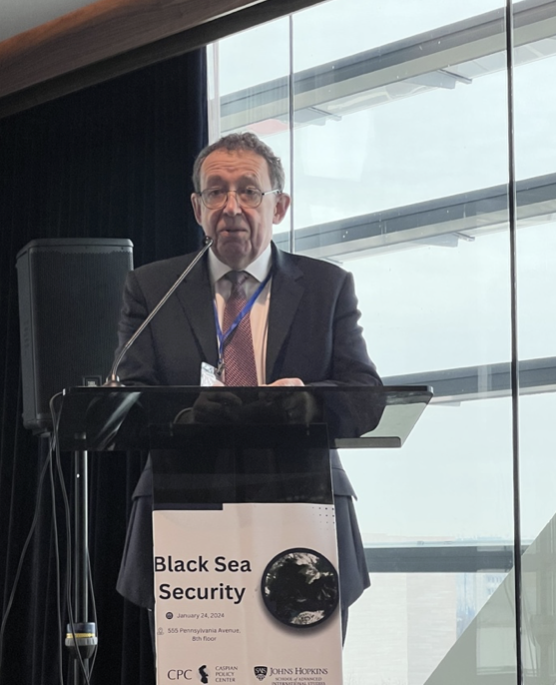
Taking a longer-term perspective, Ambassador (ret.) Steven Mann, former U.S. Caspian Energy Envoy and Ambassador to Turkmenistan, pointed to significant changes in the broader region since independence, particularly recognizing the impact of energy conduits that cross the Caucasus and Central Asia and connect to Europe. “First and foremost is the Caspian Pipeline Consortium (CPC) pipeline,” Mann said, carrying, “1.5 million barrels a day; 90% of Kazakh oil, which is the cornerstone of Kazakhstan’s independence.” The continued smooth transit of Kazakh oil through the Bosphorus highlights the cornerstone role Caspian energy has played in the Black Sea, and in ensuring stability for Central Asia as well.
The portage of Caspian gas out of Azerbaijan westward via the pipelines that connect to Turkey is another game-changer that Mann pointed to as pivotal in making the South Caucasus gas pipeline possible. “Those are very positive things,” Mann said, as was the economic transformation of Georgia. “…On the 2004 Corruption Perceptions Index of Transparency International, it ranked 130th in the world. And fast forward to 2022, it's up to 41. It's a spectacular transformation for the Black Sea region.”
Mann also recognized that Kazakh oil shippers also now seek to diversify their reliance on Russia for energy transit, shipping oil barrels across to Baku and then into the BTC pipeline. Azerbaijan has announced plans to expand natural gas output from 12 billion cubic meters (bcm) per year to 20 (bcm), Mann said, expanding the region’s energy export footprint.
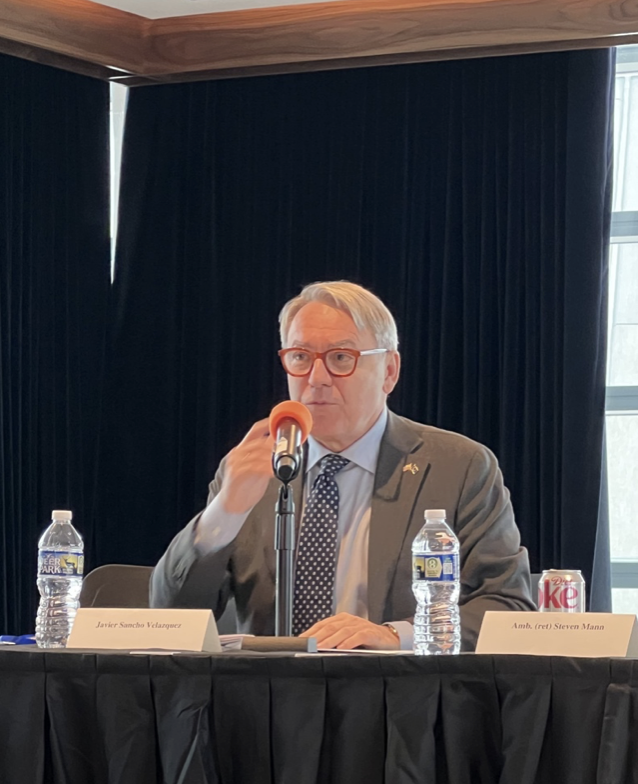
However, when we discuss energy in the Black Sea region, “we should not forget that we are talking about a wonderful, beautiful sea, and we are very much concerned about the rising impact of global warming,” said Javier Sancho Velazquez, the Head of Global Affairs and Innovation for the EU Delegation to the United States.
“The main idea here is to seek a healthy marine and coastal ecosystem and a sustainable blue economy for the Black Sea,” said Velazquez.
According to Landon Derentz, the Senior Director and Morningstar Chair for Global Energy Security at the Atlantic Council Global Energy Center, it is important “to consider innovative ways to continue to inspire a transformation and utilize the energy systems of the region in a way that are not at risk of adverse influence from Russia.” This could be achieved through either alternative energy transit routes or through alternative sources of energy.
While the Black Sea region possesses strategically important traditional energy infrastructure, it also “offers great opportunities for renewable energy,” PDAS Lochman explained earlier in the panel.
This sentiment is even more important as Azerbaijan is set to host the COP29. Regarding the upcoming COP29 in Baku, Lochman said, “Georgia and Azerbaijan are great examples of how the Black Sea is not simply about hydrocarbon exploration and exploitation. They offer great opportunities for renewable energy. Particularly, the Black Sea electricity cable that has been proposed would improve connectivity between the South Caucasus and EU energy markets. We look forward to working with Azerbaijan with the private sector and obviously many other countries on further building commitments to the energy transition and meeting our climate targets through work at COP29.”
“In 2024, as the world convenes in Baku ... the amount of progress on the energy transition, on energy security, on economic competitiveness, with partners and allies, that can emanate around an event that is so global and so important. I think [COP29] will be a really specific moment of action,” Derentz said.
“It will galvanize industry, and it will galvanize governments and political leadership,” Derentz added.
In the region, the United States’ goal is “to promote renewable energy, energy interconnection, and market integration, of course. But I believe that there is much more to do,” said Velazquez.
According to Velazquez, “With the help of the United States, there was an effective response to Russia’s weaponization of energy supplies. But, the crisis is not totally over.”
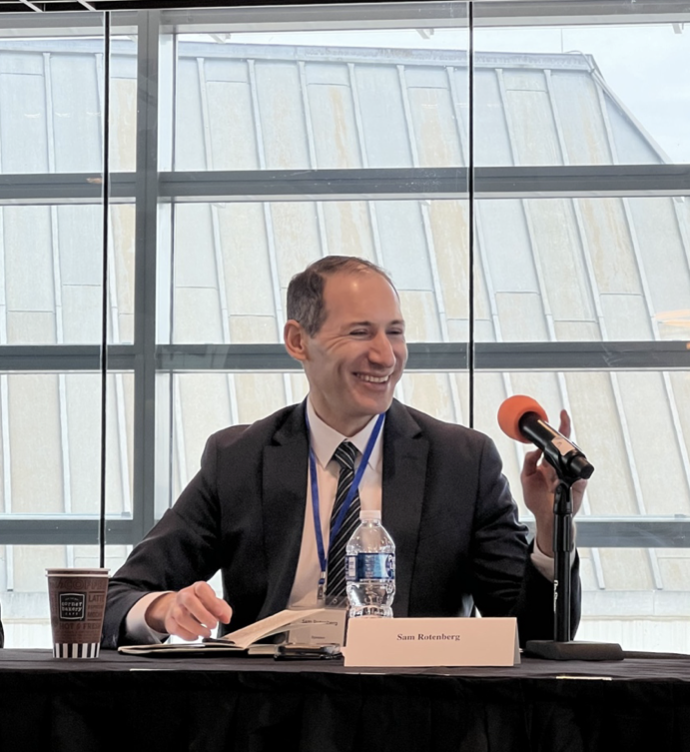
“There is a risk that something happening in the Black Sea region expends beyond..” Sam Rotenberg, an Eagleburger Fellow at U.S. Department of State, continued.
“It will take a lot of cooperation between the countries in the area to see a resolution to the Ukraine conflict as quickly as possible,” said Rotenberg.
Overall, the Black Sea Security Conference provoked hard-hitting discussion on security, economic, and energy issues affecting the region, the Caspian Region, and beyond. The conference marked the first in an upcoming tradition of similar events with the CPC and SAIS.